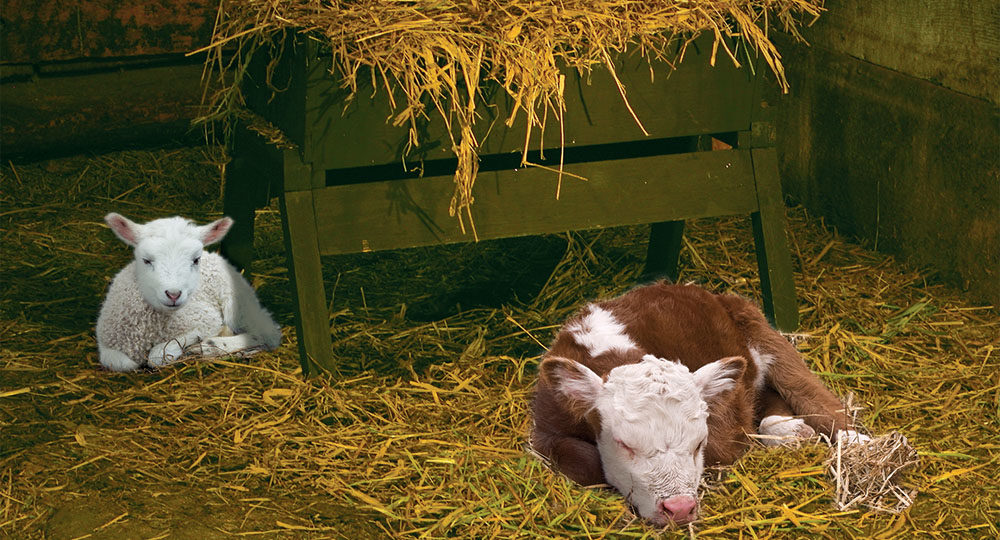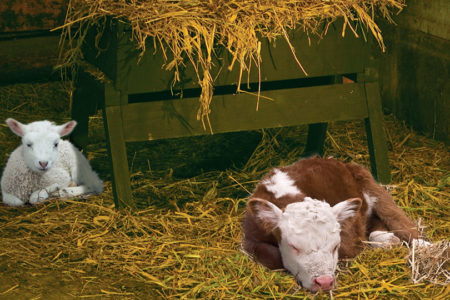Beyond the Manger
A look at who Jesus is and the miracle of His incarnation.
I love to read. In fact, I come from a family of readers. Last year my mother read more than 150 books, as well as reading through the entire Bible—something we both do each year. “The Bible,” wrote noted scholar Dr. Charles Ryrie, “is the greatest of all books; to study it is the noblest of all pursuits; to understand it, the highest of all goals.”1
The Bible is a storehouse of true wisdom and knowledge; and if more people read it and believed what it said, the world wouldn’t be in such horrific condition.
Even at this time of year, when we celebrate Jesus’ birth, most people don’t know who Jesus is. The Bible has much to say about the One who was born in a manger in Bethlehem.
His Arrival—Prophesied.
From Genesis to Malachi, the Hebrew Scriptures point to this specific Person and His First Advent as the suffering Messiah of Israel.
Genesis 3:15 is the first proclamation that God would do something unique to combat the sin that polluted His creation: “And I will put enmity between you [the serpent] and the woman, and between your seed and her Seed; He shall bruise your head, and you shall bruise His heel.”
This verse means the woman’s “seed” (a man born with no human father) would crush the head of the “serpent” (Satan, God’s enemy), destroying him for rebelling against God, deceiving Eve, and bringing sin into the world.
This prophecy was fulfilled at the cross, when Jesus delivered the deathblow to Satan and his evil rule over lost humanity. Today, through faith in Christ, God pulls people out of Satan’s kingdom one at a time (Col. 1:13) until the day when He will throw the “serpent” into the Lake of Fire forever (Rev. 20:1–3, 10).
His Pedigree—Royal.
The Hebrew Scriptures teach that the King-Messiah would be a descendant of Shem (Gen. 9:26); Abraham (12:1–3); Isaac (26:24); Jacob (28:13–15); Judah (49:10); and, of course, King David (2 Sam. 7:12–16).
Jesus was a direct descendant of David through both His mother, Mary (Hebrew, Miriam; Lk. 3:23–38) and stepfather, Joseph (Mt. 1:1–17).
His Nature—Divine.
Although Jesus was born like everyone else, He was not like anyone else. The prophet Micah revealed Jesus’ eternality 700 years before His birth: “But you, Bethlehem Ephrathah, though you are little among the thousands of Judah, yet out of you shall come forth to Me the One to be Ruler in Israel, whose goings forth are from of old, from everlasting” (Mic. 5:2).
Jesus existed and was active before He was born because He is God. The apostle Paul told believers in Colossae, “For by Him all things were created that are in heaven and that are on earth, visible and invisible, whether thrones or dominions or principalities or powers. All things were created through Him and for Him” (Col. 1:16).
The prophet Isaiah also revealed the Messiah’s eternality: “For unto us a Child is born, unto us a Son is given; and the government will be upon His shoulder. And His name will be called Wonderful, Counselor, Mighty God, Everlasting Father, Prince of Peace” (Isa. 9:6).
The term Everlasting Father literally means the “Father of Eternity” and applies to God alone. Hence, Jesus was and is “Immanuel,” “God with us” (Isa. 7:14).
Jesus spoke of His eternality many times, perhaps none clearer than when He prayed, “And now, O Father, glorify Me together with Yourself, with the glory which I had with You before the world was” (Jn. 17:5).
His Being—Holy.
The Bible also explains that Jesus was born of a Jewish virgin. This truth is critical because if Jesus had had an earthly father, He would have had a sin nature like everyone else. The sin nature is passed through the male’s seed. By being virgin born, Jesus circumvented the sin nature: He was perfect, sinless, and holy.
Many people find this fact difficult to believe. But it is no more incredible than Sarah giving birth to Isaac when she was 90 or God tormenting Egypt with 10 plagues prior to the Exodus. As God told Abraham, “Is anything too hard for the Lᴏʀᴅ?” (Gen. 18:14).
When the angel Gabriel appeared to Mary, he told her, “Do not be afraid, Mary, for you have found favor with God. And behold, you will conceive in your womb and bring forth a Son, and shall call His name JESUS” (Lk. 1:30–31). She replied, with obvious surprise, “How can this be, since I do not know a man?” (v. 34).
The angel told Mary, “The Holy Spirit will come upon you, and the power of the Highest will overshadow you; therefore, also, that Holy One who is to be born will be called the Son of God. For with God nothing will be impossible” (vv. 35, 37).
The virgin birth declared Jesus’ holiness, allowing for His once-for-all, perfect sacrifice for sin.
His Birthplace—Humble.
The Hebrew Scriptures teach that the Messiah must be born in Bethlehem (Mic. 5:2). Mary and Joseph lived in Galilee. God brought them to the right place using the Roman census:
And it came to pass in those days that a decree went out from Caesar Augustus that all the world should be registered. So all went to be registered, everyone to his own city. Joseph also went up from Galilee, out of the city of Nazareth, into Judea, to the city of David, which is called Bethlehem, because he was of the house and lineage of David, to be registered with Mary, his betrothed wife, who was with child (Lk. 2:1, 3–5).
As the weary couple arrived in Bethlehem, “the days were completed for [Mary] to be delivered. And she brought forth her firstborn Son, and wrapped Him in swaddling cloths, and laid Him in a manger, because there was no room for them in the inn” (vv. 6–7).
So the eternal God, “whose goings forth are from of old, from everlasting,” was born in a humble stable devoid of all royal trappings.
His Arrival—Proclaimed.
It appeared that this monumental event would go unnoticed. But God had another plan. He sent an angel and then a multitude of angels to announce that He was fulfilling a promise He had made to the Jewish people hundreds of years earlier:
Now there were in the same country shepherds living out in the fields, keeping watch over their flock by night. And behold, an angel of the Lord stood before them, and the glory of the Lord shone around them, and they were greatly afraid. Then the angel said to them, “Do not be afraid, for behold, I bring you good tidings of great joy which will be to all people. For there is born to you this day in the city of David a Savior, who is Christ the Lord. And this will be the sign to you: You will find a Babe wrapped in swaddling cloths, lying in a manger.” And suddenly there was with the angel a multitude of the heavenly host praising God and saying: “Glory to God in the highest, and on earth peace, goodwill toward men!” (Lk. 2:8–14).
The angels could have visited the high priest or someone of prominence in Jerusalem. Instead, God sent them to lowly shepherds. Shepherding has always seemed important to God. Abraham, Isaac, Jacob, Moses, and David all were shepherds; and Jesus would later tell His disciples, “I am the good shepherd. The good shepherd gives His life for the sheep” (Jn. 10:11).
Giving His life for His “sheep” was His destiny at His First Coming. The prophet Isaiah stated,
But He was wounded for our transgressions, He was bruised for our iniquities; the chastisement for our peace was upon Him, and by His stripes we are healed. All we like sheep have gone astray; we have turned, every one, to his own way; and the Lᴏʀᴅ has laid on Him the iniquity of us all (Isa. 53:5–6).
Joseph probably recalled Isaiah’s prophecy when an angel told him in a dream, “Joseph, son of David, do not be afraid to take to you Mary your wife, for that which is conceived in her is of the Holy Spirit. And she will bring forth a Son, and you shall call His name Jᴇꜱᴜꜱ [Hebrew, Yeshua], for He will save [Hebrew, yosheea] His people from their sins” (Mt. 1:20–21). The only way to remove sin is by blood sacrifice, something Joseph no doubt understood (see Leviticus 17:11).
His Destiny—Glorious.
Ruling as King of Israel is Jesus’ destiny at His Second Coming. To confirm that fact, God used the magi:
Now after Jesus was born in Bethlehem of Judea in the days of Herod the king, behold, wise men from the East came to Jerusalem, saying, “Where is He who has been born King of the Jews? For we have seen His star in the East and have come to worship Him” (Mt. 2:1–2).
The magi came to the capital city of the Jewish people, looking for the One who was “born King.” Traditionally, an heir is born with the right to rule. Jesus was born King. This phrase looks to the future, when He will rule as King over Israel and ultimately over all the earth. The magi confirmed what Gabriel had told Mary:
Behold, you will conceive in your womb and bring forth a Son, and shall call His name Jᴇꜱᴜꜱ. He will be great, and will be called the Son of the Highest; and the Lord God will give Him the throne of His father David. And He will reign over the house of Jacob forever, and of His kingdom there will be no end (Lk. 1:31–33).
Isaiah saw this future day: “He shall strike the earth with the rod of His mouth, and with the breath of His lips He shall slay the wicked. Righteousness shall be the belt of His loins, and faithfulness the belt of His waist” (Isa. 11:4–5). One day, the Bible declares, Jesus will return to Earth as King of kings and Lord of lords.
Joseph learned of the First Advent; Mary learned of the Second.
The Bible communicates both. The first time, Jesus came quietly, as the Lamb of God; but the second time, He will come as the Lion of Judah, with great fanfare, majesty, and power (Zech. 14:3–5; Mt. 24:29–30). What a glorious day that will be!
ENDNOTE
- Charles C Ryrie, “To the Reader,” Ryrie Study Bible, ESV edition (Chicago, IL: Moody, 2011), viii.








